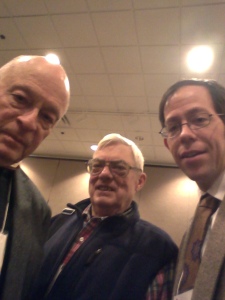So—I’ve now had experienced my first meeting of the Standing Commission on Liturgy and Music. I’ve been processing it now, both figuratively and literally. That is, I was appointed secretary so I’ve been literally processing the meeting by compiling my notes into a coherent set of minutes.
It’s an interesting group. On the balance, it’s very much weighted to the “liturgy” side rather than the “music” side. Of the members gathered, only two are full-time church musicians—there is a third who was unable to join us this time. Of course, two of the priests are quite musical as well and others of us have interests in the music area. Nevertheless, out of an appointed group of 12 that’s not too many. Musically, their interest and passion is in looking outside of the box (particularly the box represented by the ’82 hymnal) and gathering resources for world music.
On the liturgical side of things, I got only a slight sense of where people were. Clearly there are a range of views represented—as is proper—and, not surprisingly, I find myself on the more conservative side of the represented spectrum. Obviously, I don’t know how things were in the past, but I don’t think that the Commission in its current configuration can be accurately described as being united behind any one particular agenda.
Most of what we did was business stuff. We elected officers, hashed out priorities and budget requests, and tried to figure out meeting times. (And trust me, working out meeting times among 18 very full schedules is not an easy task!) Needless to say, our main priorities are those directed to us by General Convention. The four big areas that will require and demand most of our attention this triennium are 1) feedback and continued theological work on the rite for same-sex blessings, 2) work on resourcing congregational song, 3) continued work on Holy Women, Holy Men, and 4) revision of the Book of Occasional Services and materials heading into EOW (like the liturgies on the adoption of children and the creation materials). Other items that are not as front-and-center (but on which we still hope to get good work done) include material for combating Christian anti-Judaism particularly with reference to interpreting lectionary texts, criteria for acceptable biblical translations, and the electronic publication of resources.
While I’ll be involved with all of these, I signed up to work specifically on HWHM, Christian anti-Judaism, and electronic publication. While the working groups have been identified, the heads of the groups have not.
Clearly lots went on and I have thoughts and opinions on the meeting for which this is not an appropriate forum. I do want to say a little about meeting people. I’m really glad that it was a joint meeting gathering a whole lot of people into one group. I had the opportunity to meet in person many whose names have become very familiar to me over the past six or so years. I got to meet Jim Naughton in the flesh for the very first time! The Presiding Bishop addressed us and I did pass her in the hall once—nothing to report there. Gay Jennings, on the other hand, I did cross paths with several times. She comes across as a very straight-shooter and as being quite grounded; I liked what I saw of her. In passing, I met Marshall Scott, Susan Snook, reconnected with Sam Candler, and met a number of readers. I enjoyed meeting my whole group; we’re an interesting lot but I think we’ll work well together. In particular, I got to meet and share meals with two people I’ve been wanting to meet for some time—Dr. Louis Weil, liturgy professor at CDSP, and Gregory Howe, custodian of the prayer book. Here we are in a small camera phone pic: (from left to right—Louis Weil, Gregory Howe, and me)
One thing that I noticed overall across all of the many folks gathered and which I’ll probably write about further was a relative dearth of young laypeople. Liza Anderson and I were noting that so many of the younger folks there were ordained. It made me wonder if we, as a church, have succumbed to the notion that the clerical estate is the proper state for anyone that interested in church. Alternately, it underscores the difficulties that we laypeople face in participating in leadership: clergy can either get time off to travel to meetings like this or they’re on the clock while doing it. Me—it’s vacation time from work that then takes away from what’s available to spend with my wife and kids. (And I’m just glad I’m not an hourly employee anymore or it would mean lost wages as well!) At this point I have no point—I’m just putting out an observation that I hope to reflect on at leisure.
One last thing which falls under “business”… Regarding Holy Women, Holy Men, I would like to ask for your help. I’ve expressed my own opinions on the project, its overall shape, and some of its specifics both here and elsewhere. The resolution voted on at Convention (A051) directs its third resolve thus: “that the Standing Commission on Liturgy and Music continue to seek responses from the wider Church during the coming triennium.”
I’m looking for your response here.
What do you like about it? What don’t you like about it? What do you find problematic about it? Where do you see it as an improvement over Lesser Feasts & Fasts?
